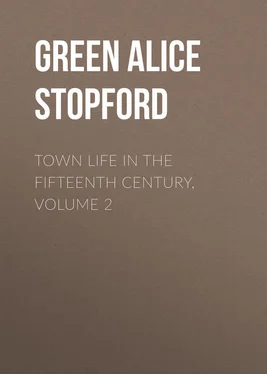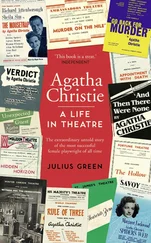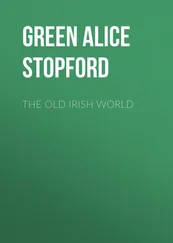Alice Green - Town Life in the Fifteenth Century, Volume 2
Здесь есть возможность читать онлайн «Alice Green - Town Life in the Fifteenth Century, Volume 2» — ознакомительный отрывок электронной книги совершенно бесплатно, а после прочтения отрывка купить полную версию. В некоторых случаях можно слушать аудио, скачать через торрент в формате fb2 и присутствует краткое содержание. Жанр: literature_19, foreign_antique, foreign_prose, Историческая проза, на английском языке. Описание произведения, (предисловие) а так же отзывы посетителей доступны на портале библиотеки ЛибКат.
- Название:Town Life in the Fifteenth Century, Volume 2
- Автор:
- Жанр:
- Год:неизвестен
- ISBN:нет данных
- Рейтинг книги:5 / 5. Голосов: 1
-
Избранное:Добавить в избранное
- Отзывы:
-
Ваша оценка:
- 100
- 1
- 2
- 3
- 4
- 5
Town Life in the Fifteenth Century, Volume 2: краткое содержание, описание и аннотация
Предлагаем к чтению аннотацию, описание, краткое содержание или предисловие (зависит от того, что написал сам автор книги «Town Life in the Fifteenth Century, Volume 2»). Если вы не нашли необходимую информацию о книге — напишите в комментариях, мы постараемся отыскать её.
Town Life in the Fifteenth Century, Volume 2 — читать онлайн ознакомительный отрывок
Ниже представлен текст книги, разбитый по страницам. Система сохранения места последней прочитанной страницы, позволяет с удобством читать онлайн бесплатно книгу «Town Life in the Fifteenth Century, Volume 2», без необходимости каждый раз заново искать на чём Вы остановились. Поставьте закладку, и сможете в любой момент перейти на страницу, на которой закончили чтение.
Интервал:
Закладка:
New distinctions of rank and caste began to appear, and an aristocracy of energy and skill constantly recruited and invigorated made its influence felt in every borough, as public honour was attached to trade in proportion to the wealth which its followers could win. The wool trade especially held a place of distinction in common esteem; and people who took to the selling of cloth were supposed to “live like gentlemen” and rejoice in a really superior station. [19] Hist. MSS. Com. ix. 174.
More and more the enriched burgher hastened to give proof that he had risen into the leisured class by donning the fine dress whose cumbrous folds bespoke a sedate idleness and luxury, so that whereas “sometime afar men might lords know by their array from other folk, now a man shall stand or muse a long throw which is which.” [20] Book of Precedence, 106. “Money maketh merchants, I tell you, over all.” Skelton’s Poems (ed. Dyce) i. 277.
As the chance of rising in the world stirred in the trader a new ambition, so it stirred too the sense of the power of knowledge. When the writer of Piers Ploughman counts up the gifts of the Spirit that were distributed among the commons at the descent of the Holy Ghost as “treasure to live by to their lives’ end,” and “weapon to fight with when Anti-Christ assaileth,” he carefully reckons in with the rest the wit to use words skilfully as preachers and prentices of law who live leally by labour of tongue, the crafts and “connynge” of sight by which men win their livelihood with selling and buying, the wisdom to till and thatch and cook as their wit would when the time came; the art of divining and dividing numbers, and all such learning of the schools. [21] “‘Though some be clannere than some, ye see well,’ quoth Grace, That all craft and connyng came of my gift.” – Passus xxii. 252-3.
Already the workers of the town were reaching forward, as some of their rough rhymes show, to a true love of learning. [22] “Son, if thou wist what thing it were, Connynge to learn and with thee to bear, Thou would not mis-spend one hour, For of all treasure connynge is the flower; If thou wilt live in peace and rest Hear and see and say the best.” Book of Precedence, 69. Another rhyme gives the lesson in ruder form. “Learn as fast as thou may and can For our Bishop is an old man And therefore thou must learn fast If thou wilt be Bishop when he is past.” – Manners and Meals, 383.
Their zeal took very practical form. Side by side with the great movement for education which was going on under the patronage of kings and queens, of archbishops and bishops, and great lords and ladies, humbler work was taken in hand by burghers and tradesmen for the teaching of their own people. [23] See Manners and Meals, lii to lxii.
The founding of free grammar schools all over England was the work of the trading classes themselves. Sometimes the schools were founded by Guilds. [24] At Lynn there was in 1383 a Guild “of young scholars”; at Worcester the Guild of S. Nicholas kept “time out of mind a free school within the said city in a great hall belonging to the said Guild called the Trinity Hall.” The Guild of Palmers supported a school at Ludlow; and so did Guilds at Stratford and at Deritend. The Guild of Kalenders in Bristol had in the twelfth century kept a school of Jews, and when that business came to an end were still charged with education, public lectures, and the management of a free library. (English Guilds, 51, 205, 196, 221, 288. See Hunt’s Bristol, 112, 249, 260.) The Drapers had a school at Shrewsbury (Hibbert’s Inf. of English Guilds, 33); and the Merchant Tailors in London (Clode, 35). I learn from Mr. A. F. Leach that at Ashburton the Grammar School founded 1314 by Bishop Stapledon of Exeter (who also founded Exeter College) was entrusted to the Guild of St. Lawrence, whose chantry-priest was the schoolmaster. The school is still kept on the site of the Guild Chapel, the original tower of which forms part of the School.
Sometimes townsmen who had thriven in the world remembered gratefully the place of their birth or their education. “By some divine chance” a “teacher of grammar learning” came to live in Rotherham about the beginning of the fifteenth century, and one of the town boys, Thomas Scott, who had been taught by him about 1430, became in 1474 Lord Chancellor, and in 1480 Archbishop of York. In 1483 he founded a college in his old home with a Provost and three Fellows who were to teach freely any one who came to them. One was to give lessons in grammar, poetry, and rhetoric; the second in music, especially singing, playing, and broken song; and if possible these two were to be priests, or at least one of them. The third Fellow was to teach writing and arithmetic to youths who were not intended for the priesthood, but for trades and other employments; for among the children of Rotherham, said the archbishop, there were many who were “valde acuti in ingenio.” [25] Hunter’s Deanery of Doncaster, vol ii. 5-6.
In the same way bishop Alcock of Rochester, the son of a Hull merchant, established a free grammar school at Hull, where the master was to “teach all scholars thither resorting without taking any stipend or wages for the same, and should have for his own wages £10.” [26] Bentham’s History of Ely Cathedral, 2nd Edition, 182. Hull Grammar School Gazette, 1891, No. 8, p. 88. See Riley’s Liber Albus, xix. There was a grammar master at Ewelme Almshouse 1461 (ibid. 627), where teaching was to be free (ibid. ix. 217-8). Four new grammar schools were opened in London in 1447, and during the reign of Henry the Sixth nine were set up in London alone (Pauli’s Pictures, 452). In 1472 Prior Selling, of Christchurch, reports to the Archbishop of Canterbury that he has provided a “schoolmaster for your grammar schools in Canterbury, the which hath lately taught grammar at Winchester and at S. Antony’s in London” (Hist. MSS. Com. ix. 105). John Syre, the grammar school master in 1436, lived in Gayhow’s tenement, S. Alphege parish (ibid. 139). The Almshouse of the poor sisters in Reading was in 1486 turned into a grammar school (Coates’ Reading, 15); there was a school in Appleby taught by a chantry priest before the middle of the fifteenth century (Transactions of Cumberland and Westmoreland Arch. Soc. part ii. vol. viii.); and one in Preston whose master was made a burgess in 1415 (Memorials of Preston Guilds, 14). In Liverpool there was an endowed free school before the reformation (Picton’s Memorials, ii. 55-6). Miss Dormer Harris has learned from the town records that the expenses of the grammar school at Coventry in the fifteenth century, were paid by the Trinity Guild – in other words, by the Corporation. It is evident that when William Bingham, who founded a grammar school attached to Clare Hall, Cambridge, says that in 1439 he passed seventy deserted schools in travelling from Hampton to Ripon by way of Coventry (Boase’s Oxford, 108), we cannot infer from this any decay in education. It may have indicated a shifting of population, or more probably perhaps the results of the effort made in 1391 to prevent villeins from being put to the clerical schools in preparation for taking minor orders and so gaining emancipation from their lords. Rot. Parl. iii. 294.
So in one way or another the work of education went on throughout the fifteenth century – a work whose magnitude and importance have been too long obscured by the busy organizers of the Reformation days, who, for the giving of a new charter or adapting the school to the new system established by law, clothed themselves with the glory of founders and bore away from their silent predecessors the honour of inaugurating a new world. Not only in the busy centres of commerce, but in the obscure villages that lay hidden in forest or waste or clung to the slopes of the northern moors, the children of the later middle ages were gathered into schools. Apparently, reading and writing were everywhere common among the people, [27] In the royal accounts the principal artizans in each craft audit such parts of the accounts as deal with labour and sign every page (Rogers’ Agric. and Prices, iv. 502).
and as early as the reign of Richard the Second the word “townsmen” had come to mean people instructed and trained, and no longer ignorant rustics. [28] Richard the Redeless, pass. ii. 41.
But the most remarkable thing about the growth of the new grammar schools was the part taken in their foundation by laymen – by the traders and merchants of the towns. The great benefactor of Sandwich, Thomas Elys, left provision in 1392 for one of the chaplains of his chantry to serve as schoolmaster for the town boys; and the son of a draper who had had his education in this school afterwards founded a grammar school. Sir Edmund Shaa, goldsmith and once Lord Mayor of London, established a school at Stockport by will in 1457, and appointed a chantry priest of the parish church, who, being “cunning in grammar,” should “freely without any wages or salary asking or taking of any person, except only any salary hereunder specified, shall teach all manner persons, children and other, that will come to him to learn as well of the said town of Stopford as of other towns thereabouts, the science of grammar as far as lieth in him for to do.” And another London mayor, Sir John Percyvale, who had been born close to Macclesfield, left money in 1502 to endow a free grammar school there, because there were few schoolmasters in that country and the children for lack of teaching “fall to idleness and so consequently live dissolutely all their days.” [29] The Will of Sir John Percivale, published by the Governors of the Macclesfield School. I am indebted to the kindness of Mr. A. F. Leach for this reference – as well as for that about Stockport, and the reference to the School Gazette and the Town Records of Hull. He informs me that the first school founded by a lay person of which we have as yet any record was at Wotton-under-Edge, and was founded by a woman, Lady Berkeley, in 1385.
It seems also that the Manchester Grammar School was first planned by a Manchester clothier, who at his death left money for its foundation; and was completed in 1524 by Hugh Oldham, Bishop of Exeter, a native of Oldham; [30] Baines’ Hist. of the County of Lancaster, i. 296-7.
the children were to be taught “after the manner of the school of Banbury,” and inhabitants of the town were compelled to contribute to its support by being forced to grind their corn at the school mills – a custom which was kept up till 1759.
Интервал:
Закладка:
Похожие книги на «Town Life in the Fifteenth Century, Volume 2»
Представляем Вашему вниманию похожие книги на «Town Life in the Fifteenth Century, Volume 2» списком для выбора. Мы отобрали схожую по названию и смыслу литературу в надежде предоставить читателям больше вариантов отыскать новые, интересные, ещё непрочитанные произведения.
Обсуждение, отзывы о книге «Town Life in the Fifteenth Century, Volume 2» и просто собственные мнения читателей. Оставьте ваши комментарии, напишите, что Вы думаете о произведении, его смысле или главных героях. Укажите что конкретно понравилось, а что нет, и почему Вы так считаете.












